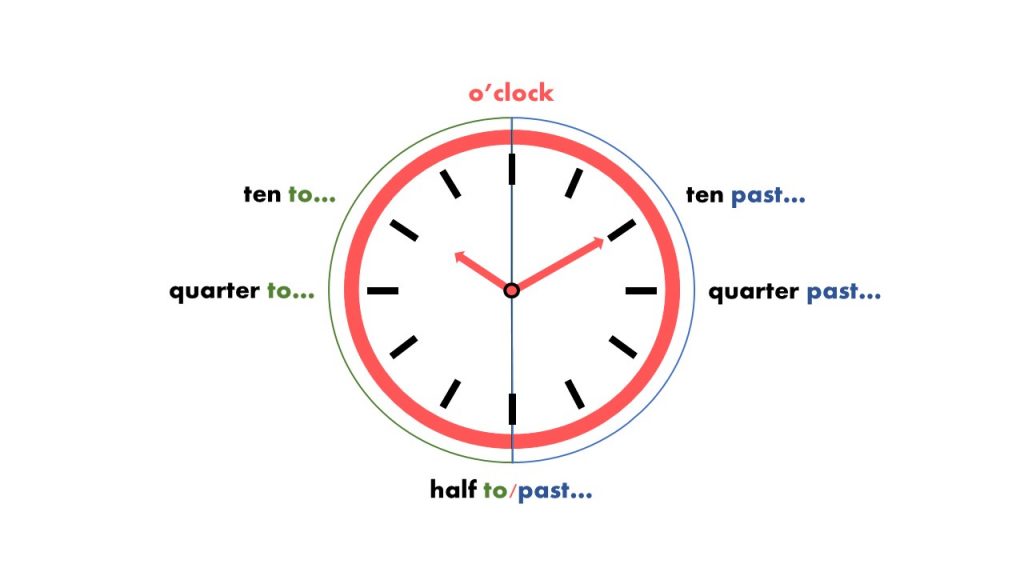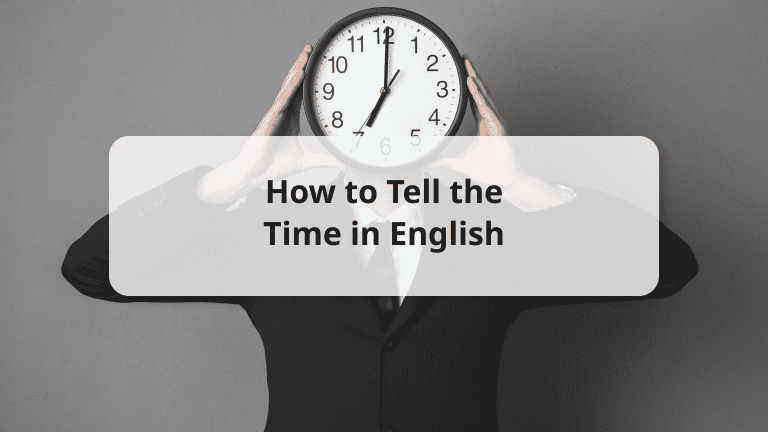Telling time in English can be easy! If you are not sure how to tell time or how to write time in English, you are in the right place! This article will provide you with a systematic guideline and lots of examples for telling time in English. Even if you are a beginner, you will know how to tell the time after reading this article no matter what time it is!
If you want to learn other related topics like months name in English, we recommend you to take beginner English lessons on AmazingTalker!

How to Tell the Time in English
English has its own rules for telling time. What do “quarter past” or “half to 6” mean? What’s the easiest way to tell the time in English when one asks for it? In the following section, we will help you acquire the knowledge about telling the time in English step-by-step.
When it is Time of the Hour (o’clock)
If the time is 1:00, 2:00,…, or 12:00, it’s the easiest time to tell. You can simply use “the hour + o’clock” to tell the time.
| Time | Written form |
|---|---|
| 1:00 | one o’clock |
| 2:00 | two o’clock |
| 3:00 | three o’clock |
| 4:00 | four o’clock |
| 5:00 | five o’clock |
| 6:00 | six o’clock |
| 7:00 | seven o’clock |
| 8:00 | eight o’clock |
| 9:00 | nine o’clock |
| 10:00 | ten o’clock |
| 11:00 | eleven o’clock |
| 12:00 | twelve o’clock |
“O’clock” can even be omitted in most cases.
10:00 = ten
When the Minute is 15, 30, or 45

When the minute is 15, we can use “quarter past + the hour”, because “quarter” means 1/4 in English, and 1/4 of 60 minutes(one hour) is 15 minutes. By the same token, with a slight change of the preposition, we can use “quarter to + the next hour” when the minute is 45. Because when the minute is 45, it is 15 minutes (a quarter of an hour) to go to the next hour.
14:15 = a quarter past 2 p.m.
14:45 = a quarter to 3
When the minute is 30, we use the term “half”, since 30 minutes is half of 60 minutes(one hour). So the structure will be “half past + the hour” or “half to + the next hour”.
5:30 = half to six = half past five
Time of the Day (Morning, Afternoon, Midnight / a.m. & p.m.)
In English, native speakers usually don’t use 24-hours time unless they are in the army. This means people don’t express time in a format like 13:00 or 21:50. Therefore, we need to add a more specific time if needed. Here’s a table of common terms and the prepositions to use for telling the time more accurately.
| Time Range | Related Term |
|---|---|
| From sunrise until 12:00 p.m. | Morning |
| From 12:00 to 06:00 p.m. | Afternoon |
| From 06:00 p.m. to 09:00 p.m. | Evening |
| From 09:00 p.m. to sunrise | Night |
| 12:00 p.m. | Noon/Midday |
| 12:00 a.m. | Midnight |
To apply these terms, we can use “number of the hour + the related term” to tell the specific time.
08:00 = eight o’clock in the morning
20:00 = eight o’clock in the evening
What do A.M. and P.M stand for?
| Time Range | Related Term |
|---|---|
| From 00:00 to 11:59 | a.m. |
| From 12:00 to 23:59 | p.m. |
08:00 = eight a.m.
20:00 = eight p.m.
Please note that we don’t use a.m./p.m. and morning/evening at the same time. For example, when you say 8 a.m., people already know you mean 8 o’clock in the morning. So it’s redundant to say “Eight a.m. in the morning”.
Tell the Hour then the Minute
If the minute is not “00”, instead, it’s 01~59, we can use “the hour + the minute” to tell the time. It’s worth noting that when the minute is 01~09, you have to add “o” when you say the minute.
11:31 = eleven thirty-one
2:04 = two o four
3:09 = three o nine
Tell the Minute then the Hour
Instead of telling the hour and then the minute, an alternative way to tell the time in English is to tell the minute first and then the hour.
- When the minute is not 00, 15, 30, or 45
In general rules, we divide the clock into two parts. When the minute is between 01~30, which means when the minute is on the right half of the clock, we use “the minute + past + the hour”.
9:13 p.m. = thirteen past nine in the evening
16:20 = twenty past four p.m.
For the other half of the clock, which means when the minute is between 30~59, we use the “the minute + to + the next hour”.
21:40 = twenty to ten at night = nine forty p.m.
6:56 = four to seven in the morning = six fifty-six a.m.
How to Ask for the Time in English?
In the previous section, we guide you to learn rules for telling the time no matter what time it is. Now, it’s also important to know how to ask for and tell the time in a conversation. Imagine you are in another country, and someone asks you for the time in English. Will you understand and know how to answer the question?
When you want to know the time at the moment but don’t have a watch/clock with you, you can ask other people “What time is it (now)?” or “Do you have the time?”. It’s worth noting that you shouldn’t say “Do you have time?” because it has a totally different meaning. Though it’s confusing for English beginners, you can pick it up in the short term if you learn grammar rules for “the”.
To tell the time, we can use “It’s + the time” to answer the questions above.
A: “Excuse me. My train will arrive at a quarter past six. What time is it now?”
B: “It’s six ten. You still have five minutes to go!”
A: “Phew! Thanks!”
How to Ask for the Time in the Future?
Sometimes we want to ask for time for something that will happen in the future. We can use “What time/When will…?” or “What time/When is… going to…?”.
A: What time will the meeting start?
B: Half past eight.
A: In the morning, right?
B: Yes. Eight thirty a.m. See you tomorrow morning!
How to Ask for the Time in the Past?
We can use “When/What time was it when…” or “When/What time did…” to ask for a time in the past.
A: What time was it when the earthquake happened last night?
B: It was (a) quarter past nine.
Now it’s Time to Practice!

Just like other language, English has its own logic and rules for telling time. This article provides you with a comprehensive guide for how we can tell the time in English. Even if you are an English beginner, you will know how to ask for and tell the time no matter what time it is. After reading this article and practicing, you should be able to give a proper answer next time someone asks you for the time in English.
Besides English, if you also want to learn how to tell the time in Spanish or time in French, language tutors on AmazingTalker are your best partners!












